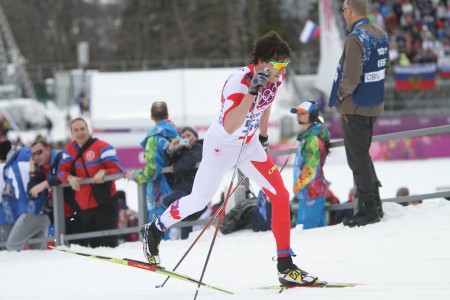
FasterSkier’s coverage is made possible through the generous support of Swix.
KRASNAYA POLYANA, Russia – It’s never a good sign when a team goes into their premiere Olympic event relying on hope.
But that’s the situation the Canadian men found themselves in for Wednesday’s team sprint.
The two men sporting the maple leaf that day were Devon Kershaw and Alex Harvey—the pair that won a glorious gold medal in the team sprint the last time the event was held at a World Championships in classical technique, in 2011 in Norway.
The athletes and their coaches were hoping for a repeat performance on Wednesday.
But Kershaw had been sick, and hadn’t shown the same form he’d had three years ago. So the team crossed their fingers and hoped for the best.
They got the worst, instead, and were unceremoniously eliminated from the race without even escaping the semifinal round.
“This is the worst feeling I’ve had since I’ve been with the team,” said Head Coach Justin Wadsworth, who started working with the Canadians in 2010. “We all wanted it. When I looked back, everything was there. We had everything in place, and, I don’t know. We’re getting a big goose egg out of it.”
The Canadian athletes offered up similarly grim statements.
Harvey, referring to his results in Sochi that were below expectations: “People say you’re going to have to learn from that. But there’s nothing to learn from this one.”
Kershaw: “I got crushed out there, and it was really difficult.”
To be fair, the Canadians were confronted with a team sprint course that seemed like it was designed to take their slim hopes for a medal and ship them off to Siberia.
Harvey, 25, and Kershaw, 31, won their 2011 gold on a fast course—one that took about 19 minutes total for each of the men to ski their three laps, for a total of six.
Wednesday’s course took much longer, clocking in at about 24 minutes, with two large hills. That added time and difficulty placed a premium on fitness over speed—a problem for Kershaw, whose best fitness had appeared to elude him this month even before he got sick.
Wadsworth could have gone to his backup, Len Valjas—no slouch of a sprinter, who has cracked the podium on the World Cup circuit multiple times.
But Valjas has had his own struggles—he’s had knee problems this season, and had been sick earlier in the games and failed to qualify in the top 30 in the individual sprint last week.
“Lenny was also a bit of a question mark,” Wadsworth said. “If I’d had a 100 percent backup, it would have been a harder decision, but Devon felt like his energy was pretty good today, and he was really motivated and up for the effort, so we decided to go with that.”
The Canadians were stuck in the first of two semifinals, with Germany, which was one of three teams that ended up breaking away from the pack in the finals, though their medal hopes were ultimately derailed by a crash.
Kershaw, the first leg of the Canadian team, was stacked up against a 23-year-old wrecking ball of a German named Hannes Dotzler, who along with Switzerland’s Dario Cologna strung out the pace.
Things started coming apart for Kershaw on the second of his three laps, which he finished six seconds down to Cologna.
Harvey couldn’t do much to bring the Canadians back, and then by the time Kershaw finished his last lap, the team was 35 seconds off the pace. At the crest of the last hill, Kershaw—like many other men—was so exhausted he could barely double pole over the top.
“It was a really, really, crazy hard race. I’ve never seen a semifinal so blown open like that,” he said afterwards.
Harvey ultimately lost more time, bringing the team home in sixth place, 45 seconds behind.
At that point, before the second semifinal had finished, the Canadians still had a chance to advance, which Kershaw could barely even contemplate.
“If I make the final, good Christ,” he said. “I’m shattered, so hopefully other people are, too.”
Harvey took his own share of responsibility for Wednesday’s result, telling reporters that “today was not great.”
“I wasn’t strong enough,” Harvey said.
Afterwards, Wadsworth was asked by a Canadian journalist how much of the responsibility he took for the team’s lackluster results.
“All of it,” he responded. “It’s not a fun job right now. That’s all I can say. I’m going to go back, and every night I review what we did, and what we’ve done. It all looks good on paper—something’s missing. I’m not sure what.”
Nathaniel Herz
Nat Herz is an Alaska-based journalist who moonlights for FasterSkier as an occasional reporter and podcast host. He was FasterSkier's full-time reporter in 2010 and 2011.



